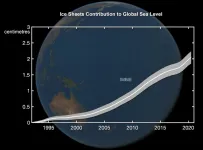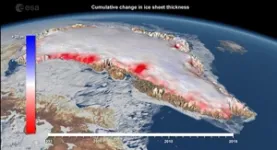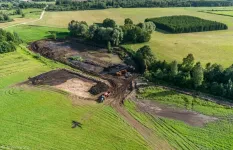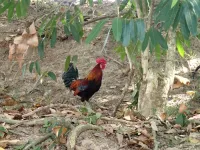(Press-News.org) The seven worst years for polar ice sheets melting and losing ice have occurred during the past decade, according to new research, with 2019 being the worst year on record.
The melting ice sheets now account for a quarter of all sea level rise – a fivefold increase since the 1990’s – according to IMBIE, an international team of researchers who have combined 50 satellite surveys of Antarctica and Greenland taken between 1992 and 2020.
Their findings are published today in the journal Earth System Science Data.
Global heating is melting the polar ice sheets, driving up sea levels and coastal flooding around our planet. Ice losses from Greenland and Antarctica can now be reliably measured from space by tracking changes in their volume, gravitational pull, or ice flow.
NASA and the European Space Agency (ESA) and awarded funding to the Ice Sheet Mass Balance Intercomparison Exercise (IMBIE) in 2011 to compile the satellite record of polar ice sheet melting. Data collected by the team is widely used by leading organisations, including by the Intergovernmental Panel on Climate Change (IPCC).
In their latest assessment, the IMBIE Team – which is led by Northumbria University’s Centre for Polar Observations and Modelling – have combined 50 satellite surveys of Antarctica and Greenland to determine their rate of ice melting.
They have found that Earth’s polar ice sheets lost 7,560 billion tonnes of ice between 1992 and 2020 – equivalent to an ice cube that would be 20 kilometres in height.
The polar ice sheets have together lost ice in every year of the satellite record, and the seven highest melting years have occurred in the past decade.
The satellite records show that 2019 was the record melting year when the ice sheets lost a staggering 612 billion tonnes of ice.
This loss was driven by an Arctic summer heatwave, which led to record melting from Greenland peaking at 444 billion tonnes that year. Antarctica lost 168 billion tonnes of ice – the sixth highest on record – due to the continued speedup of glaciers in West Antarctica and record melting from the Antarctic Peninsula. The East Antarctic Ice Sheet remained close to a state of balance, as it has throughout the satellite era.
Melting of the polar ice sheets has caused a 21 mm rise in global sea level since 1992, almost two thirds (13.5 mm) of which has originated from Greenland and one third (7.4 mm) from Antarctica.
In the early 1990s, ice sheet melting accounted for only a small fraction (5.6 %) of sea level rise. However, there has been a fivefold increase in melting since then, and they are now responsible for more than a quarter (25.6 %) of all sea level rise. If the ice sheets continue to lose mass at this pace, the IPCC predicts that they will contribute between 148 and 272 mm to global mean-sea level by the end of the century.
Professor Andrew Shepherd, Head of the Department of Geography and Environmental Sciences at Northumbria University and founder of IMBIE, said: “After a decade of work we are finally at the stage where we can continuously update our assessments of ice sheet mass balance as there are enough satellites in space monitoring them, which means that people can make use of our findings immediately.”
Dr Inès Otosaka from the University of Leeds, who led the study, said: “Ice losses from Greenland and Antarctica have rapidly increased over the satellite record and are now a major contributor to sea level rise. Continuously monitoring the ice sheets is critical to predict their future behaviour in a warming world and adapt for the associated risks that coastal communities around the world will face.”
This is now the third assessment of ice loss produced by the IMBIE team, due to continued cooperation between the space agencies and the scientific community. The first and second assessments were published in 2012 and 2018/19.
Over the past few years, ESA and NASA have made a dedicated effort to launch new satellite missions capable of monitoring the polar regions. The IMBIE project has taken advantage of these to produce more regular updates, and, for the first time, it is now possible to chart polar ice sheet losses every year.
This third assessment from the IMBIE Team, funded by the ESA and NASA, involved a team of 68 polar scientists from 41 international organisations using measurements from 17 satellite missions, including for the first time from the GRACE-FO gravity mission. Importantly, it brings the records of ice loss from Antarctica and Greenland in line, using the same methods and covering the same period in time. The assessment will now be updated annually to make sure that the scientific community has the very latest estimates of polar ice losses.
Dr Diego Fernandez, Head of Research and Development at ESA, said: “This is another milestone in the IMBIE initiative and represent an example of how scientists can coordinate efforts to assess the evolution of ice sheets from space offering unique and timely information on the magnitude and onset of changes.
“The new annual assessments represent a step forward in the way IMBIE will help to monitor these critical regions, where variations have reached a scale where abrupt changes can no longer be excluded.”
The study, Antarctic and Greenland Ice Sheet mass balance 1992-2020 for IPCC AR6, is published in the journal Earth System Science Data, and the new dataset is publicly available on the British Antarctic Survey website.
END
Polar ice sheet melting records have toppled during the past decade
The seven worst years for polar ice sheets melting and losing ice have occurred during the past decade, according to new research, with 2019 being the worst year on record.
2023-04-20
ELSE PRESS RELEASES FROM THIS DATE:
Companies’ zero-deforestation commitments have potential to halve cattle-driven deforestation in Brazilian Amazon
2023-04-20
Cattle-rearing is the biggest cause of tropical deforestation in the Amazon - and the world.
A study has found that some of the world’s largest slaughterhouses reduced cattle-driven deforestation in the Amazon by 15% - equivalent to sparing 7,000km2 of forest from clearance (4.5 times the size of London) - through their commitment to zero-deforestation policies between 2010 and 2018.
If these policies were fully implemented and adopted across all cattle companies operating in the Amazon, 24,000km2 of forest (an area larger than Wales) could have been spared over this time, effectively halving cattle-driven deforestation in Brazil.
Deforestation ...
Exposure to air pollution during pregnancy increases risk for flu
2023-04-20
During pregnancy, women are more susceptible to severe respiratory infections from multiple viruses, including influenza A virus (IAV), respiratory syncytial virus (RSV) and severe acute respiratory syndrome coronavirus (SARS-CoV-2). Additionally, pregnant women are disproportionately affected by influenza, resulting in a more than 10-fold increase in hospitalization risk.
A new study led by Dr. Natalie Johnson, associate professor in the Texas A&M University School of Public Health’s Department of Environmental and Occupational Health, shows that exposure to ultrafine particles (UFPs) during pregnancy enhances respiratory ...
Trim the sugar: New HIV vaccine design improves immune response
2023-04-20
LA JOLLA, CA— A new HIV vaccine from Scripps Research has shown a significantly improved ability to neutralize the virus in preclinical tests, and it will soon be studied in healthy people who volunteer to participate in clinical trials.
The new and unique vaccine design, described in a paper in Nature Communications on April 9, 2023, uses tiny protein “nanoparticles” to display multiple copies of HIV’s surface protein Env, thus presenting itself to the immune system much as real HIV particles would ...
Immediate carbon cuts, common marine heatwave terminology urged
2023-04-20
Over the past two hundred years, the ocean and atmosphere have been accumulating massive amounts of carbon dioxide as factories, automobiles, airplanes, and more churn out the powerful greenhouse gas. Two articles published recently in Nature by University of Hawai‘i at Mānoa oceanographers provide a reality check on the limitations of carbon dioxide removal and a warning that marine heatwaves need clear definitions so communities can adapt.
Carbon dioxide removal is not the golden ticket
In all the scenarios assessed by the Intergovernmental Panel on Climate Change, nations around the world must dramatically and rapidly reduce their dependence ...
Paul Hessburg receives Distinguished Landscape Ecologist Award
2023-04-20
Paul Hessburg received the International Association for Landscape Ecology-North America Chapter’s 2023 Distinguished Landscape Ecologist Award. The annual award recognizes major scientific contributions to landscape ecology, honors scientists who have played a pivotal role in shaping the field, and is the organization’s highest honor.
Hessburg is a senior research ecologist with the USDA Forest Service's Pacific Northwest Research Station based at the Wenatchee Forestry Sciences Laboratory. He was honored for a highly diverse career that has "greatly enhanced the capacity of landscape practitioners to develop strategies and ...
Cut council tax for green gardeners to help cities tackle climate change
2023-04-20
Homeowners should be rewarded to garden sustainably, new research by Professor of Environmental Horticulture at University of Sheffield, recommends
Rewards for sustainable gardening could include reductions to council tax, water bills or assistance with resources
Ensuring urban gardeners have the ability to have planted gardens will have numerous benefits for the environment and communities
Banning environmentally damaging materials, such as pesticides; or practices such as installing astroturf, could also benefit the environment
Research shows that some cities may have lost as much as 50 per cent of their green garden space over the last ...
Online tool found to be effective at assessing dementia risk
2023-04-20
Researchers at UNSW Sydney and Neuroscience Research Australia (NeuRA) have developed and evaluated a tool for assessing dementia risk, with promising initial results.
Currently, over 55 million people are living with dementia around the world, with that number set to increase to 78 million by 2030, and the focus on dementia research increasingly shifting towards prevention.
The online tool takes approximately 20 minutes to complete and provides a personalised dementia risk report that patients can discuss with their doctor.
Since developing the risk tool – known as CogDRisk – in 2022, the team has been evaluating the success of the tool, by trialling it on four existing datasets, ...
A myth no more: Cranberry products can prevent urinary tract infections for women
2023-04-20
Drinking cranberry juice has long been a mythical prevention strategy for women who develop a urinary tract infection – and new medical evidence shows consuming cranberry products is an effective way to prevent a UTI before it gets started.
A global study looking at the benefits of cranberry products published in Cochrane Reviews has determined cranberry juice, and its supplements, reduce the risk of repeat symptomatic UTIs in women by more than a quarter, in children by more than half, and in people susceptible to UTI following medical interventions by about ...
Recycling lake sediments for crop production: A sustainable solution for closing the phosphorus cycle
2023-04-20
A four-year field experiment conducted on the shores of restored Lake Mustijärv in Viljandi, Estonia, has revealed that recycling phosphorus-rich lake sediments back to agriculture could have positive impacts on crop production.
The study was conducted by doctoral researcher Mina Kiani and the AgriChar research group, and it is globally the first of its kind to cover the environmental aspects of recycling lake sediments to agriculture over several years. Kiani defends her thesis on 21 April at the University of Helsinki Faculty of Agriculture and Forestry.
The study aimed to find a sustainable solution for closing the leaking agricultural phosphorus (P) cycle by recycling P-rich ...
Chicken breeding in Japan dates back to fourth century BCE
2023-04-20
Conclusive evidence of chicken breeding in the Yayoi period of Japan has been discovered from the Karako-Kagi site.
The chicken is one of the most common domesticated animals, with a current estimated population of over 33 billion individuals. They are reared for their meat and eggs, and may be kept as pets.
The chicken is believed to have been domesticated in Southeast Asia about 3500 years ago, following which they were carried to all corners of the world. The exact date of introduction of chicken breeding to Japan is under debate, as there are no historical records and archeological evidence ...
LAST 30 PRESS RELEASES:
Natural selection operates on multiple levels, comprehensive review of scientific studies shows
Developing a national research program on liquid metals for fusion
AI-powered ECG could help guide lifelong heart monitoring for patients with repaired tetralogy of fallot
Global shark bites return to average in 2025, with a smaller proportion in the United States
Millions are unaware of heart risks that don’t start in the heart
What freezing plants in blocks of ice can tell us about the future of Svalbard’s plant communities
A new vascularized tissueoid-on-a-chip model for liver regeneration and transplant rejection
Augmented reality menus may help restaurants attract more customers, improve brand perceptions
Power grids to epidemics: study shows small patterns trigger systemic failures
Computational insights into the interactions of andrographolide derivative SRJ09 with histone deacetylase for the management of beta thalassemia
A genetic brake that forms our muscles
CHEST announces first class of certified critical care advanced practice providers awarded CCAPP Designation
Jeonbuk National University researchers develop an innovative prussian-blue based electrode for effective and efficient cesium removal
Self-organization of cell-sized chiral rotating actin rings driven by a chiral myosin
Report: US history polarizes generations, but has potential to unite
Tiny bubbles, big breakthrough: Cracking cancer’s “fortress”
A biological material that becomes stronger when wet could replace plastics
Glacial feast: Seals caught closer to glaciers had fuller stomachs
Get the picture? High-tech, low-cost lens focuses on global consumer markets
Antimicrobial resistance in foodborne bacteria remains a public health concern in Europe
Safer batteries for storing energy at massive scale
How can you rescue a “kidnapped” robot? A new AI system helps the robot regain its sense of location in dynamic, ever-changing environments
Brainwaves of mothers and children synchronize when playing together – even in an acquired language
A holiday to better recovery
Cal Poly’s fifth Climate Solutions Now conference to take place Feb. 23-27
Mask-wearing during COVID-19 linked to reduced air pollution–triggered heart attack risk in Japan
Achieving cross-coupling reactions of fatty amide reduction radicals via iridium-photorelay catalysis and other strategies
Shorter may be sweeter: Study finds 15-second health ads can curb junk food cravings
Family relationships identified in Stone Age graves on Gotland
Effectiveness of exercise to ease osteoarthritis symptoms likely minimal and transient
[Press-News.org] Polar ice sheet melting records have toppled during the past decadeThe seven worst years for polar ice sheets melting and losing ice have occurred during the past decade, according to new research, with 2019 being the worst year on record.






